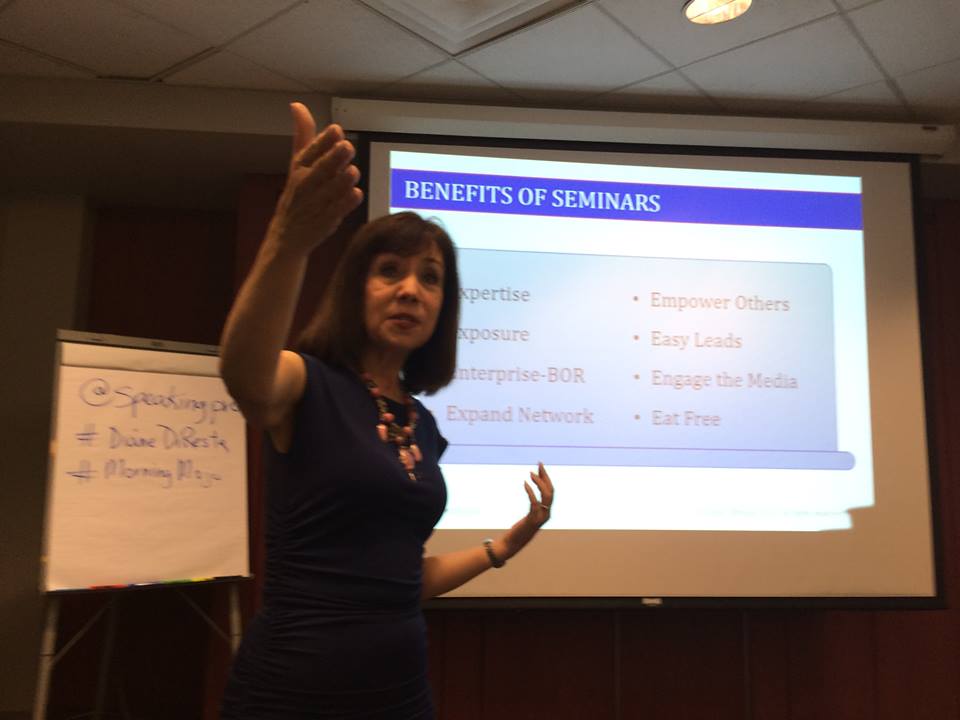Most small businesses are overlooking the most powerful and cost effective marketing strategy to increase sales. Creating and delivering a 20 to 45 minute seminar, can go a long way in positioning entrepreneurs to capture more leads and increase sales. Unlike more traditional cold calling, the benefits of seminar selling keep on giving.
Selling with seminars establishes thought leadership. When prospects hear a business owner talk about a topic, it immediately positions the speaker as an expert.
It is also increases exposure. Speaking gives the entrepreneur an additional platform to meet a wider audience of prospects and clients and to establish a strong brand. Greater exposure creates an opportunity for publicity. Savvy public speakers invite reporters and send a press release to their local media. The ultimate benefit is the ability to capture more leads in less time.
But seminar selling can backfire if the speaker makes these mistakes:
- Wrong Audience - Business owners who complain that public speaking doesn’t lead to sales are probably in front of the wrong audience. The ideal audience to target are buyers and referral sources. If you're talking about retirement planning you probably don't want to talk to colleges because students aren’t buyers. But if you're talking to trust and estate attorneys they could refer you to their clients. Speaking in front of the wrong audience is speaking for free. Speaking to buyers is marketing.
- Poor Platform Skills - Nothing will derail a selling opportunity faster than a boring presenter. Too many experts get overlooked because they are dispassionate, long winded, or disorganized. To be a credible expert it takes more than knowledge, experience and a solution. It takes confidence. Liken it to a job interview. On paper, the candidate is a great fit. But in the interview, the person displays weak body language and lacks enthusiasm. You question whether the candidate is up to the job. In other words, the person becomes less credible. To influence your prospects, it’s passion and confidence that sell.
- Hard Selling From the Platform - This is the equivalent of an infomercial. If your presentation screams "SELLING" the audience will resist. How long do you listen to an infomercial? Most people don’t like to be sold. Realize that from the first few minutes of your talk the audience is the most guarded. They are shielding themselves from a sales attack. The best approach is not to sell but to educate. Once they regard you as an expert who is there to inform, they’ll relax and want to know how they can get more of you.
- No Real Value - This is not the same mistake as number 3. In this scenario, the presenter is not selling but the presentation doesn’t work because it’s a puff piece. The audience starts to wonder why they are there and where this is going. To provide value, talk about trends. What are your predictions for the market? Healthcare? Real estate? What do they need to do now to catch the next wave? How are they leaving money on the table? Give them practical tips they can use immediately. An image consultant can show women how to look thinner with the right fit. A social media company can display a before and after slide of a LinkedIn profile. Challenge their thinking. Describe their problem and they’ll want your solution. The key to effective seminar selling is to provide value.
- Bait and Switch - People came to your presentation because they were interested in your topic. A number of years ago I attended a lecture by a celebrity in the self-help industry. There was a morning and an afternoon presentation. After reading the brochure description I signed up for the morning presentation. To my surprise, this celebrity announced that he wanted to take the talk in another direction and he’d cover this topic in the afternoon. Well, I only signed up for the morning session! I felt cheated and angry and never paid to see him again. Deliver what you promised even if only five people show up. Your integrity is on the line.
- No Offer - A moment ago we talked about not selling from the platform. But that doesn’t mean you don’t have an agenda or a strategy. Of course, you’re there to establish trust, promote your brand, and initiate a relationship. The purpose of speaking is to market your business. So make an offer at the end of your talk. Offer a free consultation. Invite them to your website to download a free eBook or report. Offer them one gift of value.
- No Follow-Up - Prospects get excited when they hear about possibilities and solutions. If you tap into their dreams they’ll want to get on board with you. Unfortunately, as excited as they are in the room, as soon as they leave, they are back to business and your presentation is a distant memory. It's not that they weren't interested. It's that everyday life takes over.So collect their cards and be sure to follow up within 24 hours. This mistake costs entrepreneurs a lot of sales. The fortune is in the follow up.
Public speaking can be a powerful marketing strategy that saves you time and money while gaining new leads. As with all marketing, it takes, planning, execution, and follow up.
If you’re looking for a one step close, this may not be the way to go. But if you’re willing to follow up and nurture the relationship, seminar selling can yield tremendous rewards.


